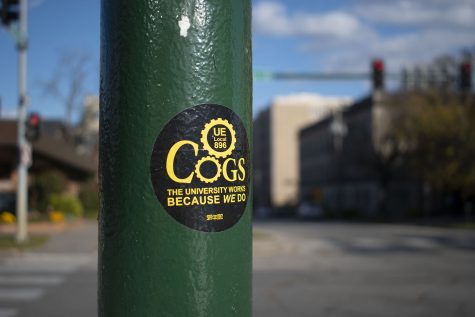Johnson County librarians oppose Iowa bills looking to change intellectual freedom
Bills introduced in the current legislative session raised concerns among intellectual freedom supporters and local librarians.
The Iowa City Public Library is seen on Sunday, March 20, 2022.
March 20, 2022
Johnson County libraries have spoken out against bills proposed by Iowa lawmakers that would have made challenging library materials easier and created punishments for librarians and educators deemed to be distributing obscene material.
The Iowa City Public Library Board of Trustees issued a statement on Feb. 24, opposing four bills in the Iowa Legislature that the board felt would curb intellectual freedom.
Of the four bills referenced in the board’s Feb. 24 statement, three have since failed to pass the Legislature’s second funnel deadline, which requires a bill to pass out of one chamber of the legislature.
Tom Rocklin, vice president of Iowa City Public Library Board of Trustees, said the board felt it was necessary to release a statement on recent actions by the Iowa legislature that could curb the kind of content available in libraries and place punishments on educators and librarians.
“In the current climate of controversy around intellectual freedom, we felt it was important to let the community know where the governing board of the Iowa City Public Library stood on the issues,” Rocklin said in an interview with The Daily Iowan.
Only one bill discussed in the press release, House File 2498, is still active.
It was not passed by a chamber, but it was placed on unfinished business, meaning it can come up again later in the session. It would remove the requirement for school librarians to have a master’s degree.
“[HF2498] removes language that requires schools to hire one certified librarian per school district, allowing districts to hire personnel that have no training or experience in selecting appropriate materials for students,” the library board’s press release said. “These bills claim ‘transparency,’ but transparency already exists for every library in the state.”
Of the four bills, House File 2321 and House File 2176, were not passed, but would have impacted the type of collections allowed in both public libraries and school libraries. Senate File 2364 was also not passed.
RELATED: Iowa City Public Library reopens for limited browsing, Bookmobile returns
“HF2321 empowers City Councils to overrule a library board in terms of placement of an item within a library collection as well as limiting an item to patrons above a certain age,” the board wrote.
Rocklin said the intent of House File 2321 was clear — to circumvent library boards and professional librarians from making decisions regarding what is included in collections.
“Our library board doesn’t decide what materials are going to be acquired or how they’re going to be circulated,” he said. “We do have a pretty extensive policy that guides the staff on those questions.”
Coralville Public Library Director Alison Ames Galstad said intellectual freedom is everyone’s right to access information and to choose what to read or engage with within the constructs of the law.
“During my time as a librarian, this seems to be definitely the height of what I have seen during my professional years,” she said.
Iowa City Public Library’s Board of Trustees released a statement regarding bills introduced in early February that could have impacted how libraries function.
Galstad said the Coralville Public Library Board of Trustees reviewed collection and material selection policies in March.
“So, the March meeting was the meeting that they reviewed our collection development and material selection policy, which also includes as an addendum statement of concern about library’s resources, which is the form that patrons can fill out or citizens can fill out if they have a complaint about a life about a library book or magazine or something,” she said.
The Coralville board also reviewed information in March created and shared by the American Library Association, Galstad said.
“They reviewed the Library Bill of Rights, which is an American Library Association document that’s been around for probably 90 years,” she said. “It’s revised regularly, but it is a list of things that should guide libraries in their services, just basic policies,”
Galstad said after that meeting a board member contacted the rest of the board regarding creating a statement.
“That decision hasn’t been made or a statement hasn’t been approved or anything, but they are well aware of what Iowa City did and they come from that same place of recognition,” she said.
Galstad said she has worked as a librarian for 30 years, and this is the highest realm of threats to intellectual freedom she’s witnessed.
“This is a particularly divisive time in our culture,” Galstad said. “You can certainly go back in history to the 50s, the post-war years in the 50s, and see similar attacks on intellectual freedom.”





















